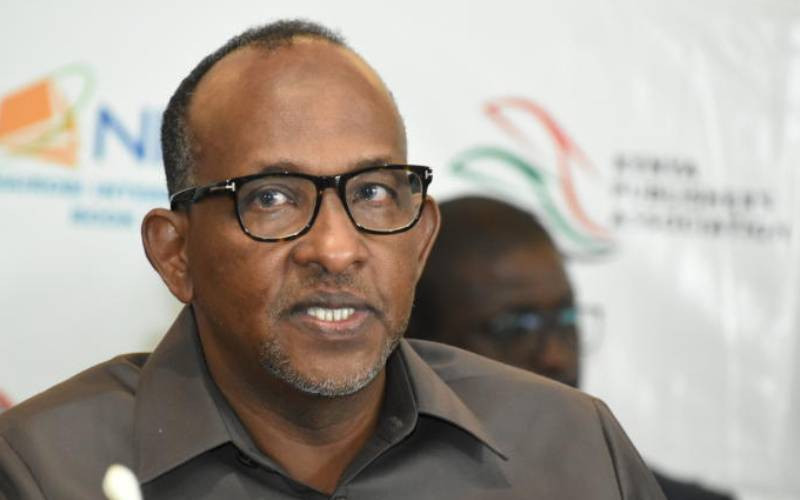By LEONARD KULEI
Baringo, Kenya: When President Uhuru Kenyatta bought 20 goats for Tiaty MP Asman Kamama during the historic Baringo Kimalel Goat Auction in December last year, many Kenyans treated it as a gift to a friend. But it was not just a gift. Beneath the gesture was a coded message the President was passing to the MP, which he made known. “I have bought 20 goats for Kamama, halafu hiyo maneno ingine nisisikie tena (let me not hear of the other matter again).”
Uhuru was referring to cattle rustling that has pitted the Pokot community against its Tugen neighbours. Kamama represents the constituency inhabited by Pokots, who have historically been blamed for engaging in the vice.
With his message, Uhuru wanted Kamama to end the practice his community has been accused of perpetrating, and which is evidenced in the countless raids in Baringo County.
From Ngaratuko to Kaborion, and from Arabal to Chepkesin, huge tracTs of land lie unoccupied.
Residents have fled in thousands after dreaded Pokot bandits descended on their villages, killing at will and driving away herds of animals.
What has been home to more than 5,000 families for decades now remains a ghostly village. Kaborion, a village more than 200km north of Kabarnet town in Baringo County, has literally been a battleground, at least in the last seven years. Pokot bandits are allegedly encroaching on the vast grazing land after killing an estimated 20 people since 2008.
Currently, the Tugen, Ilchamus and Pokot, all neighbours inhabiting the pastoralist districts of Baringo, live in mutual hatred, a silent commitment to destroy one another and zeal to revenge. The tension in Baringo County has always dragged the name of Tiaty MP Asman Kamama to the centre of the conflict.
Brutal attacks
For a man who since 1992 served as District Officer (DO1) before joining politics in 2002, many expected him to be better placed to end banditry. But he has been viewed as “watching helplessly”. In 2012 alone, it is estimated that more than 50,000 animals were driven away from Baringo North and South.
What is astonishing in all these brutal attacks is that Kamama is said to have elected a deafening silence and inaction, raising questions on his commitment to end the menace.
Victims point to systematically executed attacks, all meted in the run up to elections. The legislator is said to have given the issue a wide berth, further raising concerns on whether anyone could be using the menace to win subsequent elections in a region whose literacy levels are below nine per cent. But Kamama, when confronted with such claims, vehemently denies a role in the attacks and displacements in the region.
The secret war allegedly waged by Kamama’s community, according to displaced victims, is a territorial expansion in pursuit of grazing land.
Currently, residents say, there is heavy presence of armed Pokot militiamen, who roam freely and shoot at any “alien” in a land that has been occupied by the Tugen for decades. They have taken over Kaborion, Tuluk, Wanab and parts of Yatya.
“They have taken over our ancestral land. We are now refugees in our own land,” says Harrison Aengwo, a resident of Chepkesin in North Baringo. Residents view Kamama as a calculative politician, always joining parties that end up being in government. “The MP has always gone to Parliament on a party that forms the government or friendly to government of the day,” says Peter Kandagor, a resident of Bartabwa, in Baringo North. In 2002, he went to Parliament in a Ford-People ticket, an affiliate to the Rainbow Coalition that ruled till 2007.
Stay informed. Subscribe to our newsletter
In a fascinating political turnaround, he opted to Party of National Unity in 2007 against the euphoria created by ODM, which swept the North Rift vote. Kamama, who served a short stint as minister of the powerful Public Service docket in 2008 and as Assistant minister in Higher Education in the same year, has been accused by some MPs of being part of a scheme that watered down a government disarmament exercise, which targeted the Pokot and other armed communities.
This is attributed to his current strategic position as chairman of the Parliamentary Committee on National Security and Administration, a powerful organ whose decisions cannot be challenged even by Interior Secretary Joseph ole Lenku.
Locked horns
Kamama has several times locked horns with Baringo legislators over his commitment and honesty to weed out cattle rustling.
Recently, MP Grace Kipchoim, (Baringo South) wanted Kamama to declare whether he was committed to fighting cattle rustling. Kipchoim claimed she had sought ways of collectively tackling the menace but Kamama was never supportive.
“How can he continue to hold parliamentary committee meetings on national security while his peoples’ aggression against neighbouring communities such as the Tugen in Baringo North and Arabal, Samburu and parts of Laikipia goes untamed?” said Kipchoim.
Kipchoim is calling for the resignation of Kamama from the parliamentary committee.
According to Baringo North MP William Cheptumo, Kamama has failed in his duty to convince his people to embrace peace, as his constituents continue to pose a grave danger to the region.
“Many lives have been lost, people maimed, others displaced, most left paupers after their livestock were stolen in the name of rustling, yet the leadership of Tiaty, led by Kamama, MCAs and elders, are not talking to their people,” said Cheptumo. He says rustlers are criminals, but that the leadership in Pokot is unwilling to condemn the raids openly.
“As an elected leader, you approached the people who, then, listened to you and voted you in and I don’t see the reason elected leaders should not go back to the people and plead with them to stop rustling,” said the legislator, who was Justice Assistant minister in the previous regime. But Tirioko Ward MCA Stephen Maklap defends Kamama, saying he is the man who ended the animosity that persisted for ages between the Pokot and the Marakwet.
He says Kamama’s name should not be dragged into the issue. “Kamama is a national figure and rustling should not be used as a sling to derail his political career. He does not condone stealing and has warned criminals in many occasions against their actions,” says Maklap.
Also in Kamama’s defence is Silale MCA Nelson Lotellah, who maintains the MP is a peace champion whose ideals and vision for the Pokot is unrivalled. He says the lawmaker has warned bandits that they should take responsibility when arrested.
Kamama, in many of his public meetings has exonerated himself from blame, terming rustling a ‘pure criminal’ activity.
“All leaders, professionals and businessmen from Pokot are 100 per cent against rustlers, and we allowed the Inspector General when he toured the County to deal with the criminals,” he says.
Kamama says he has been instrumental in ending animosity between his community and the Marakwet. “The animosity between Pokot and Marakwet came to a stop immediately I was elected. I cannot thus be blamed for what is going on between my community and Tugens,” he said.
He played down claims he was misusing his position as the chair of the House committee on security, adding he has overseen voluntary surrender of arms by members of his community, something he says few leaders would do if it were their people who were being targeted. “The disarmament was a national policy and I could not stop or even influence it at a personal level,” he said.
 The Standard Group Plc is a
multi-media organization with investments in media platforms spanning newspaper
print operations, television, radio broadcasting, digital and online services. The
Standard Group is recognized as a leading multi-media house in Kenya with a key
influence in matters of national and international interest.
The Standard Group Plc is a
multi-media organization with investments in media platforms spanning newspaper
print operations, television, radio broadcasting, digital and online services. The
Standard Group is recognized as a leading multi-media house in Kenya with a key
influence in matters of national and international interest.
 The Standard Group Plc is a
multi-media organization with investments in media platforms spanning newspaper
print operations, television, radio broadcasting, digital and online services. The
Standard Group is recognized as a leading multi-media house in Kenya with a key
influence in matters of national and international interest.
The Standard Group Plc is a
multi-media organization with investments in media platforms spanning newspaper
print operations, television, radio broadcasting, digital and online services. The
Standard Group is recognized as a leading multi-media house in Kenya with a key
influence in matters of national and international interest.







